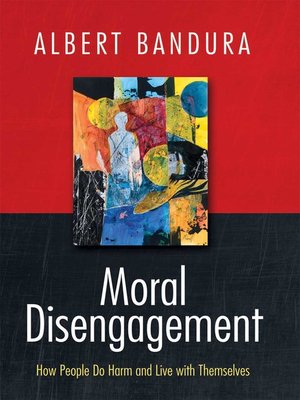Moral Disengagement
ebook ∣ How Good People Can Do Harm and Feel Good About Themselves
By Albert Bandura

Sign up to save your library
With an OverDrive account, you can save your favorite libraries for at-a-glance information about availability. Find out more about OverDrive accounts.
Find this title in Libby, the library reading app by OverDrive.



Search for a digital library with this title
Title found at these libraries:
| Loading... |
How do otherwise considerate human beings do cruel things and still live in peace with themselves? Drawing on his agentic theory, Dr. Bandura provides a definitive exposition of the psychosocial mechanism by which people selectively disengage their moral self-sanctions from their harmful conduct. They do so by sanctifying their harmful behavior as serving worthy causes; they absolve themselves of blame for the harm they cause by displacement and diffusion of responsibility; they minimize or deny the harmful effects of their actions; and they dehumanize those they maltreat and blame them for bringing the suffering on themselves. Dr. Bandura's theory of moral disengagement is uniquely broad in scope. Theories of morality focus almost exclusively at the individual level. He insightfully extends the disengagement of morality to the social-system level through which wide-spread inhumanities are perpetrated. In so doing, he offers enlightening new perspectives on some of the most provocative issues of our time, addressing:Moral disengagement in all aspects of the death penalty—from public policy debates, to jury decisions, to the processes of execution The social and moral justifications of major industries—including gun manufacturers, the entertainment industry, tobacco companies, and the world of "too big to fail" finance Moral disengagement in terrorism, and how terrorists rationalize the use of violence as a means of social change Climate change denial, and the strenuous efforts by some to dispute the overwhelming scientific consensus affirming the impact of human behavior on the environment"Al Bandura is the most cited individual in the history of psychology for the depth, breadth and originality of his ideas and writings. Now with his ground-breaking new contribution, Moral Disengagement, his reach extends not only to teachers and students but also to the general public —making them aware of everyday evils in many spheres of daily life that must be counteracted by mindful moral engagement." ——Phil Zimbardo, Ph.D. Author, The Lucifer Effect; President, The Heroic Imagination Project"The authoritative statement by the world's most-cited living psychologist, laying out his influential theory. Plunge into these fascinating historical and modern case studies of moral disengagement—morality tales for all time, illuminated by the psychology of how people do harm to themselves and others."— Susan T. Fiske, Psychology and Public Affairs, Princeton University 'If you have wondered why good people do bad things, and even terrible and horrible things, then this is the only book you ever will have to read." ——Robert J. Sternberg, Professor of Human Development, Cornell University"Dr. Albert Bandura is one of the great behavioral scientists of our time. His superb contributions include a deep analysis of human morality, its fundamental importance and the complexity of its development." ——David A. Hamburg, MD, Visiting Scholar, American Association for the Advancement of Science; DeWitt Wallace Distinguished Scholar, Weill Cornell Medical College; President Emeritus, Carnegie Corporation of New York






